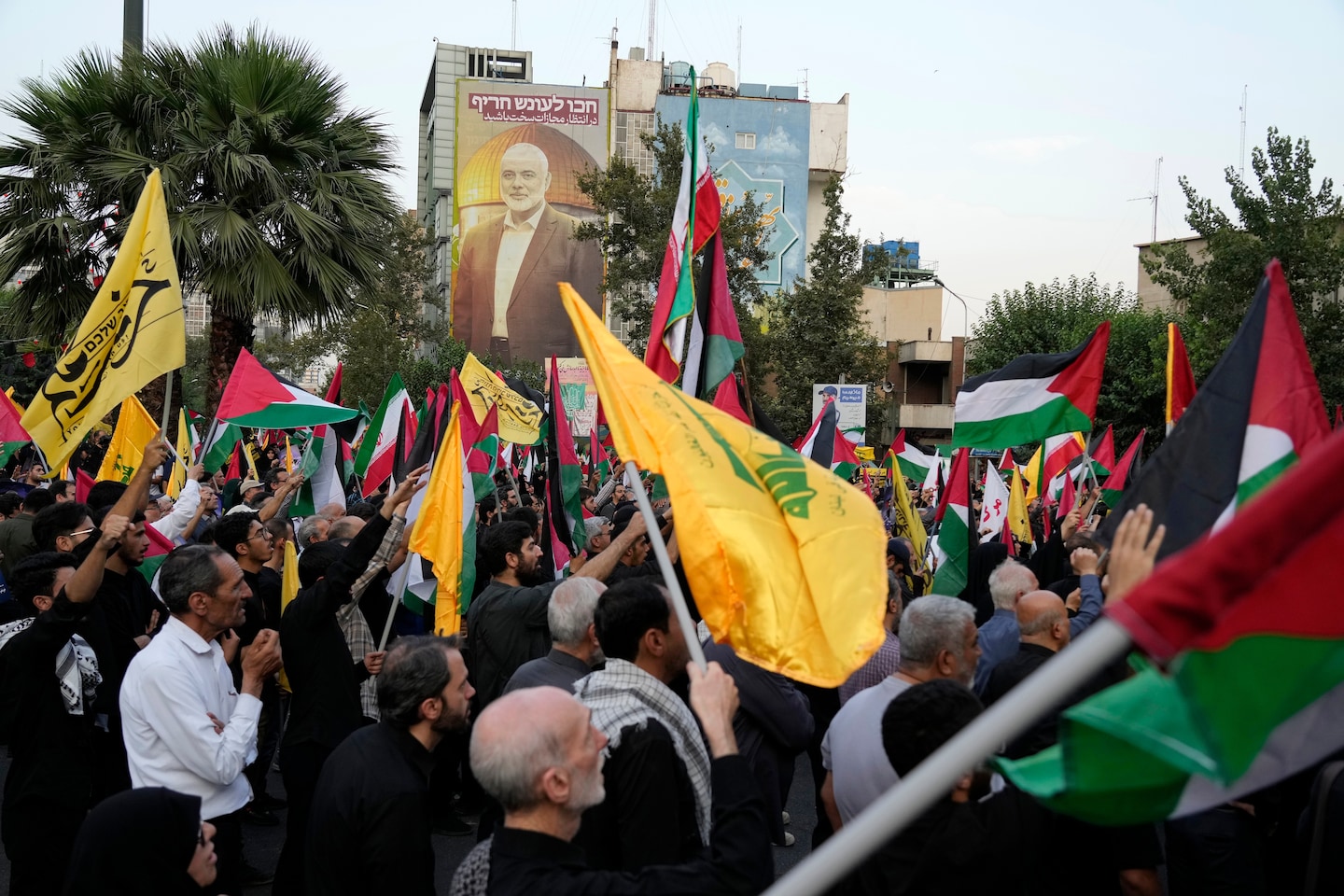Iran vowed to retaliate against Israel for the assassination of a Hamas leader in Tehran on Wednesday, an escalation in a years-long shadow war between the adversaries that in recent months has burst into the open with several high-profile attacks.
Israel has not claimed responsibility for the attack.
The assassination of Haniyeh, who was in Tehran for the inauguration of Iranian president Masoud Pezeshkian on Tuesday, is a stinging embarrassment for the country’s security forces and a significant blow to one of its closest allies. Iran’s rulers didn’t say how they would respond. Some in the country were bracing for sweeping arrests.
The Iranian government, gripped at home by a spiraling economic crisis and simmering unrest against increased social restrictions, has successfully dodged direct confrontation with Israel for months. Short of a miscalculation, analysts say, it’s unlikely Haniyeh’s assassination will upset that balance.
But Khamenei said Israel has “prepared a harsh punishment for itself,” and Iran’s Revolutionary Guard warned that any response would be “harsh and painful.” State television anchors read the statements during rolling coverage of the attack Wednesday.
Haniyeh was one of the hundreds of leaders, diplomats and dignitaries in Tehran for Pezeshkian’s inauguration, an event that Pezeshkian said showcased “a powerful, peace-seeking, and dignified Iran.”
Pezeshkian was elected on a wave of support for Iran’s reformists that appeared to reflect significant frustration with Iran’s clerical rulers. During his inaugural address, he promised that “constructive engagement” would be the “cornerstone” of his government’s foreign policy.
But after news of the attack broke, Pezeshkian’s tone shifted.
“The Islamic Republic of Iran will defend its territorial integrity, honor, pride and reputation,” Pezeshkian said in a statement posted on X on Wednesday with a photo of himself and Haniyeh on Tuesday clasping hands. Israel, he said, would “regret its cowardly action.”
Many feared the attack, less than a full day into Pezeshkian’s term, has already derailed Pezeshkian’s plans for limited reform. Ordinary Iranians said the event was shocking and unsettling.
“This shows how deeply they have penetrated the security grid of the Islamic Republic,” Reza, a 29-year-old pharmacist in Tehran, told The Washington Post. Speaking on the condition that his last name be withheld for fear of reprisals, he said he expected that any Iranian response would also involve its allies in Yemen, Lebanon and Gaza.
The attack Wednesday followed an Israeli strike Tuesday that killed a senior Hezbollah leader in Lebanon. Israel claimed responsibility for the attack on Hezbollah military commander Fuad Shukr on the outskirts of Beirut on Tuesday night but refused to comment on the attack on Haniyeh in Tehran on Wednesday.
Iran released little information about that attack, including where, exactly, it occurred. State media said Haniyeh was killed at 2 a.m. local time when a “raid” struck the guesthouse where he was staying in largely residential northern Tehran. Initial reports that it was an airstrike were not confirmed by officials.
Support for Haniyeh, Hamas and other armed groups who openly attack Israel has been a defining element of Iran’s foreign policy for years. Tehran calls the groups the “Axis of resistance,” a loose alliance that also includes the Houthis in Yemen and Hezbollah in Lebanon.
Iranian commanders who work closely with the axis were targeted in an Israeli airstrike in April. Two Iranian officers were killed in that attack on Iran’s diplomatic compound in Damascus.
Iran responded with a highly telegraphed show of strength that appeared carefully calibrated to minimize actual damage — and limit further reprisals. The county launched hundreds of missiles and drones at Israel, the vast majority of which were intercepted by Israeli missile defense systems. The sides avoided further escalation.
The missile barrage was launched largely by Iranian forces from Iranian territory. Analysts say this round could see coordinated attacks by Iranian allies from other countries.
“This wasn’t just a strike on Tehran,” said Sanam Vakil, director of the Middle East and North Africa program at London’s Chatham House think tank. Unlike the April strike on Iranian personnel, she noted, the Wednesday attack targeted a non-Iranian senior member of Hamas, and so can be interpreted as an attack on all the groups allied with Iran.
“It opens the door to an axis-led response, not just an Iranian response,” she said.
Iran announced plans for a funeral procession through central Tehran on Thursday morning. Mourners were told to gather at Tehran University and march to Azadi square, a route often used for official state ceremonies.
Haniyeh’s body is to be flown to Qatar for burial. Haniyeh had lived in exile in Qatar with other Hamas officials since the group’s Oct. 7 attacks on Israeli communities near the Gaza Strip triggered Israeli’s military campaign against the group.
Inside Iran, people contacted by The Washington Post feared the prospect of mass arrests in the days ahead, similar to a spike in arrests that followed an attack claimed by the Islamic State group in Iran this year.
Iran’s prosecutor general announced an investigation to hold people accountable for “negligence or fault” in Haniyeh’s death, according to state media. Activists warned that the government could use the attack as a pretext to cast a broad net.
Frustration is still simmering over the government’s violent response to protests after the 2022 death in morality police custody of Mahsa Amini, a 22-year-old woman detained for allegedly failing to wear a hijab properly. Social restrictions since then appeared to ease, but in recent months, security forces and morality police have returned to the country’s streets in force.
Afshon Ostovar, a professor of national security affairs at the Naval Postgraduate School in California, said Iran’s deep embarrassment over the security failures that allowed Wednesday’s attack will motivate the regime’s leadership to launch a highly visible response.
“This is a cycle of retaliation,” he said. “Iran may not be able to stop Israel from hitting them, but every time they are hit, they can cause some pain.”

